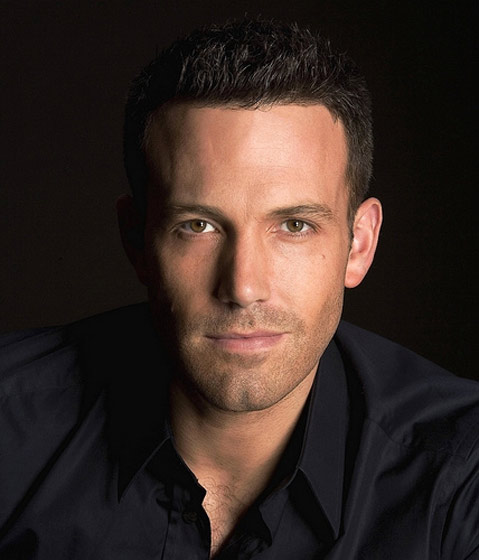Ben Affleck Takes the Right Direction
Blockbuster Actor and Now Acclaimed Director to Receive Modern Master Award
“What is the play and what is my part?” asked Ben Affleck’s character in the 1998 film Shakespeare in Love. Fifteen years later, with three critically acclaimed directorial efforts under his belt, Affleck seems to be answering those questions. Certainly after this year’s Argo, which recently earned him a Golden Globe for Best Director and for Best Film (he also produced and starred in it), Affleck has etched out a comfortable niche for himself in Hollywood as a multifaceted artist.
His prowess for storytelling shouldn’t be a surprise. Affleck became a household name not for the supporting role he had in 1997’s Good Will Hunting, but for the Academy Award he and childhood friend Matt Damon received for that film’s Best Original Screenplay. Despite his early success as a film scribe, Affleck spent the next decade or so becoming a movie star, both in blockbusters such as Armageddon and Pearl Harbor as well as in smaller movies like Hollywoodland and State of Play.
In 2007, however, Affleck moved behind the camera for Gone Baby Gone, his directorial debut. Adapted from Denis Lehane’s best-selling book of the same name, Affleck showed natural instincts for leading a cast and crew. Although the film didn’t shatter box office records, it was well received by critics — described as “taut, fast, achingly authentic,” by the Washington Post — and put Affleck on the ones-to-watch list.

Three years later, Affleck’s director cred was cemented with his second film The Town, which opened at number one at the box office. He co-wrote the script, directed, and starred in the movie. The Town was a critical success that, according to A.O. Scott of the New York Times, showed “evidence of Mr. Affleck’s skill and self-confidence as a director.”
Now, with Argo, Affleck is receiving accolades left and right — in addition to his Golden Globe wins, Argo is Oscar-nominated for Best Picture as well as three BAFTA (British Academy of Film and Television Arts) Awards for Best Film, Best Actor in a Leading Role, and Best Direction. Last fall, Affleck came to Santa Barbara to screen his new film and attend one of the Santa Barbara International Film Festival’s regular Cinema Society events, where he revealed much of went into the making of his most recent film.
As he did with his previous films, Affleck took on several jobs for Argo, serving as producer, star, and director, which begged the question of how he juggled so many responsibilities. “I just compartmentalized the different tasks,” Affleck told the event’s host, SBIFF director Roger Durling. “There is the director’s space, the acting time in my brain, which is a smaller amount, and I am able to do both in fact and I am accustomed to be in front of a camera while it’s rolling and working that way. It’s just based on how much time you have, that it cuts into my directing concentration time. Some directors, I am sure, could think about the movie half the day and the rest doing a crossword puzzle. That is not me. I need to have the sort of constant attention.”
And he had his hands full with Argo, which tells a story from three different perspectives in Hollywood, Washington D.C., and Iran. “I pitched…that there were three worlds and each were going to be distinct visually, filmatically, and in the way the camera moved,” Affleck told the audience. “I wanted to have Iran feel alien, I didn’t want the audience to feel as if they have seen this before or familiar. If it was familiar I thought that it would make it less unnerving or less unpredictable.” He did so with handheld cameras and grainier film stock. For Hollywood, Affleck used zooms that were popular in the 1970s, and for D.C., he went with a more “anamorphic” style a la All the President’s Men.
Perhaps it could be seen as a risky move to make a film about a political event that happened more than three decades ago. Would today’s audiences relate to the story? “I thought for a movie that was made about an event 35 years ago was extraordinarily relevant to where we find ourselves today,” commented Affleck. “Particularly geopolitically and the nature of the story, which is about the inception of the conflict between Islamic Republican of Iran and the U.S….What is our relationship going to be with Iran? Are we going to engage militarily, diplomatically, or support an Israeli strike? So for this I felt a huge amount of responsibility to construct a movie that is profoundly accurate because it is going to be out there in the ether.
“There were some of the larger macro issues this movie dealt with, particularly in themes with politics and engaging ourselves with other countries and how we are going to get along with the Islamic world,” he explained further. “Then underneath that there were some very intimate themes that I thought people could relate to, particularly storytelling….This movie is about how storytelling was powerful in the political theater.”
Regardless of the tale Affleck chooses to tell, his achievements have come from a tenacious attitude, high standards, and lots of mucking in. “I have learned through my career that there is no substitution for hard work,” he said. “My success bears a direct relationship to how hard I have worked on things every time. So I am obsessed and frantic about everything all the time. I need to make sure that I am doing something to make the movie better.”
It’s a formula that has clearly paid off. As for his future, Affleck’s Shakespeare in Love character may have foreshadowed his career best when he said,”Pay attention and you will see how genius creates a legend.” Indeed.
Ben Affleck will be honored with the SBIFF Modern Master Award, on Friday, January 25, 8 p.m., at the Arlington Theater.



